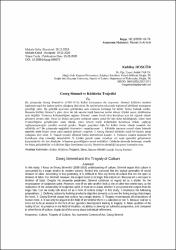| dc.contributor.author | Hoşgör, Kubilay | |
| dc.date.accessioned | 2021-03-23T08:26:24Z | |
| dc.date.available | 2021-03-23T08:26:24Z | |
| dc.date.issued | 2020 | en_US |
| dc.identifier.uri | https://doi.org/10.20981/kaygi.699575 | |
| dc.identifier.uri | https://hdl.handle.net/20.500.12809/9072 | |
| dc.description.abstract | Bu çalışmada Georg Simmel’ın (1958-1918) kültür kavrayışını ele alıyorum. Simmel kültürün modern toplumda trajik bir kadere teslim olduğunu ileri sürer. Bu teslimiyetin arkasında toplumsal işbölümü mantığının genelliği yatar. Bu genellik uyarınca işbölümüne açık olmayan herhangi bir kültür formu bulmak zordur. Bununla birlikte Simmel’a göre, özne bir tek sanatta trajik kaderine teslim olmaz. Çünkü sanat, işbölümüne açık değildir. Umutsuz kötümserliğine rağmen Simmel, sanatı öznel tinin kurtuluşu için bir sığınak olarak görmeye devam eder. Oysa iki dünya savaşının ardından sanata şimdi bir kez daha bakıldığında, öznel tinin evrenselliğinin gerçekleşme alanı olarak, onun özneyi trajik kaderinden korumaya imkân sağlayıp sağlayamayacağını yeniden sormak gerekir. Bugün gerçekten hala bir kültür formu olarak sanattan söz edilebilir mi? Bu çalışmada aşağıdaki önermeleri vurguluyorum: 1. Kültürün tanımını nesnel olana bakarak yapmak, esere biçim veren canlı enerjiyi görmeyi engeller. 2. Georg Simmel kültürün trajik bir kadere sahip olduğunu ileri sürer. 3. Trajedi insanın zihninin bütün üretimlerini kuşatır. 4. Yalnızca sanatın alanında bir kurtuluşun olup olmadığı tartışılabilir. 5. Çünkü gerçek sanat, trajediye yol açan (genetik) gelişimimiz karşısında bir tür öze dönüştür. 6.Sanatın gerçekliğinin temel nitelikleri: Görünün alanında bulunuşu, otantik bir bakış geliştirebilişi ve kültürün diğer formlarına kıyasla, bireyin incelmişliği kaygısını üzerinden atışı. | en_US |
| dc.description.abstract | In this study, I focus on Georg Simmel's (1958-1918) understanding of culture. Simmel argues that culture is surrounded by a tragic destiny in modern society. Behind this surround lies the logical generality of social division of labor. According to this generality, it is difficult to find any forms of culture that are not open to division of labor. For Simmel, however, the subject resist to its tragic fate only in art. Because art is not open to division of labor. Despite his desperate pessimism, Simmel continues to regard art as a shelter for the emancipation of subjective spirit. However, now if we take another look at the art after two world wars, as the realization of the universality of subjective spirit, it must be re-asked whether it can protect the subject from its tragic fate. Can we really talk about art as a form of culture today? In this study, I emphasize the following propositions: 1. Defining culture by looking at what is objective prevents us to see the living energy that shapes the work. 2. Georg Simmel argues that culture has a tragic destiny. 3. Tragedy encompasses all productions of human mind. 4. It can only be argued in the field of art whether there is a salvation or not. 5. Because real art is turns out to be an essence in the face of our (genetic) development leading to tragedy. 6. Basic qualities of the reality of art: Its presence in the field of intuition, its ability to develop an authentic perspective, and compared to other forms of culture, it gets rid of the worry about individual refinement. | en_US |
| dc.item-language.iso | tur | en_US |
| dc.publisher | Bursa Uludağ Üniversitesi’ | en_US |
| dc.relation.isversionof | 10.20981/kaygi.699575 | en_US |
| dc.item-rights | info:eu-repo/semantics/openAccess | en_US |
| dc.subject | Kültür | en_US |
| dc.subject | Sanat | en_US |
| dc.subject | Georg Simmel | en_US |
| dc.subject | Sanatın otantik içeriği | en_US |
| dc.title | Georg Simmel ve Kültürün Trajedisi | en_US |
| dc.item-title.alternative | Georg Simmel and the Tragedy of Culture | en_US |
| dc.item-type | article | en_US |
| dc.contributor.department | MÜ, Edebiyat Fakültesi, Felsefe Bölümü | en_US |
| dc.contributor.authorID | 0000-0003-2257-2571 | en_US |
| dc.contributor.institutionauthor | Hoşgör, Kubilay | |
| dc.identifier.volume | 19 | en_US |
| dc.identifier.issue | 1 | en_US |
| dc.identifier.startpage | 61 | en_US |
| dc.identifier.endpage | 79 | en_US |
| dc.relation.journal | Kaygı. Bursa Uludağ Üniversitesi Fen-Edebiyat Fakültesi Felsefe Dergisi | en_US |
| dc.relation.publicationcategory | Makale - Uluslararası Hakemli Dergi - Kurum Öğretim Elemanı | en_US |


















